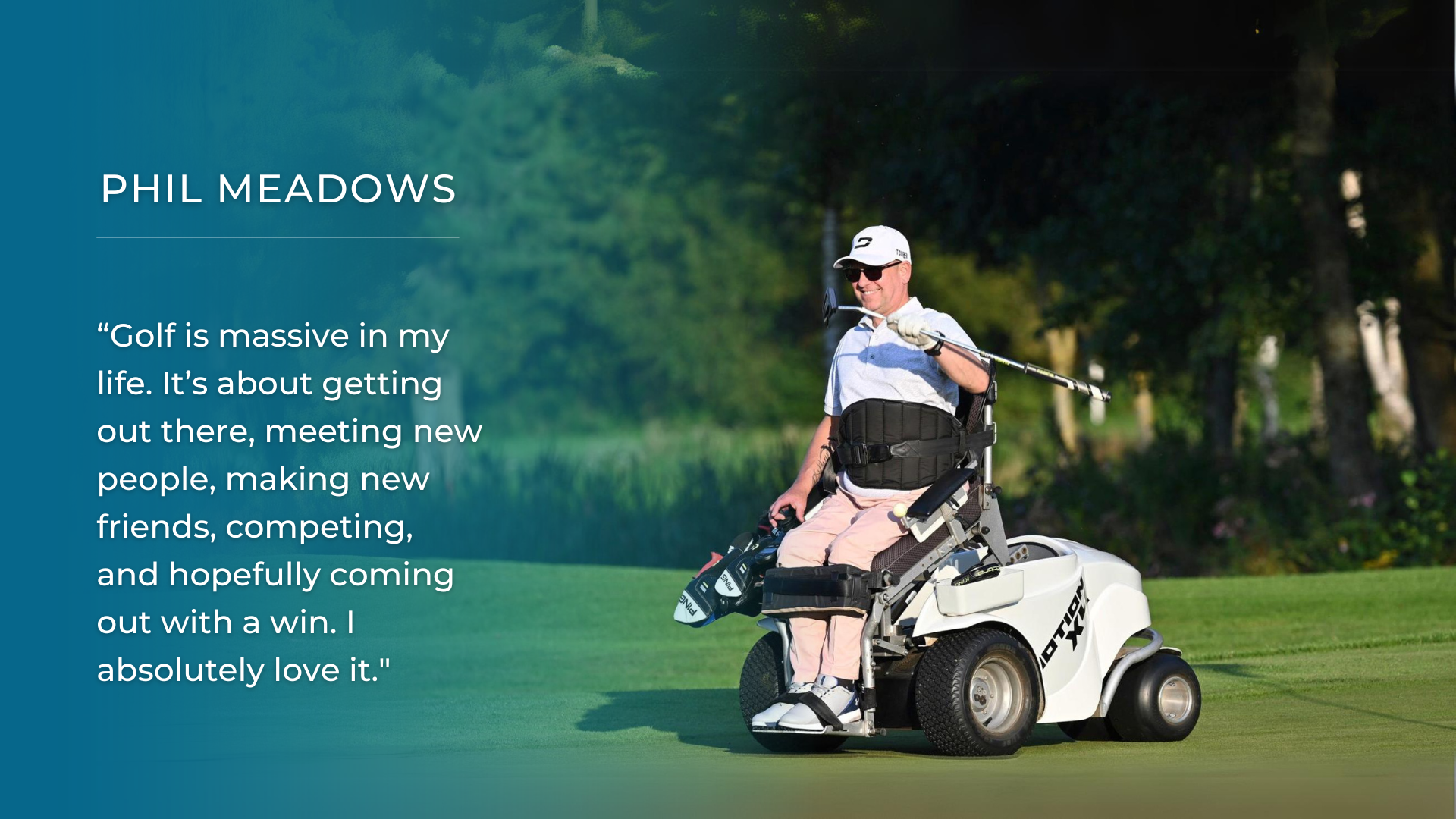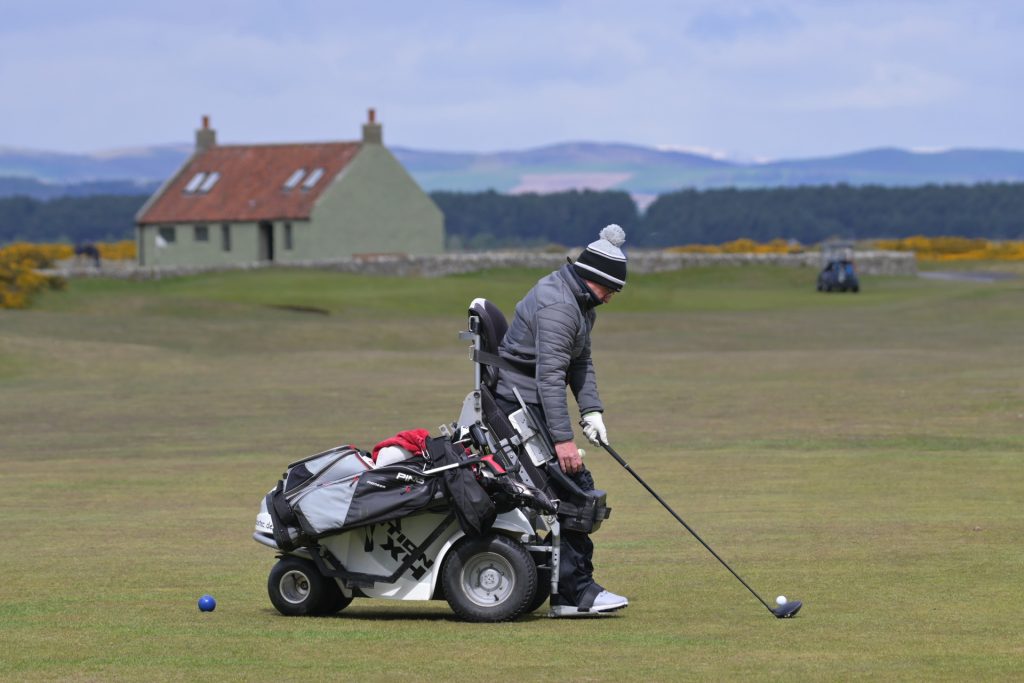
England’s Phil Meadows is a golfer who, aged 53, is still improving, and 2023 has offered him memorable new competitive opportunities. Thinking closely about golf, and what it has given him, are part of what makes him tick. This season he has been able to compete in – when his busy work diary permitted – international golf events from St Andrews and Royal Burgess in Scotland, to Woburn and Kings Norton in England, playing top golf courses and making new “friends for life” along the way.
Golf is good for him, very good. Phil believes passionately in the value of the game for the health benefits and social inclusion for those who play it.
“Yes, 100%, I would tell somebody to give it a go. It’s about being out in the fresh air, meeting new people, competing. It can be a frustrating game, trying to hit a little ball around the field, but it’s about that interaction with other people, making new friends, good for your health and mental wellbeing. People could say that about other sports I suppose, but I think that golf is just fantastic.”
Phil is a member of The Cambridgeshire Golf Club and says he loves the natural feel, and the trees around this course with its gentle undulations and challenging test for its players.
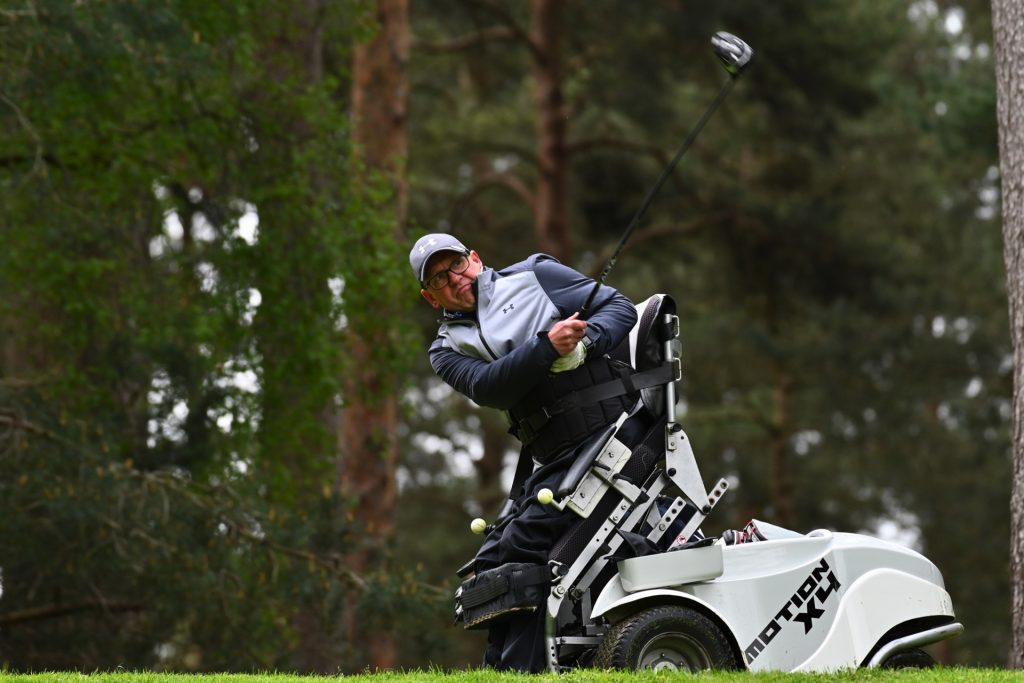
On the growing international ‘G4D’ circuit (golf for the disabled), it has been a year of firsts for the Cambridge man in EDGA tournaments. A season that has seen Phil become a World Ranked seated golfer who in May was one of 80 golfers with a range of disabilities from around the world to tee it up in the history-making, first G4D Open at Woburn (the tournament directly linked to the world-famous Open Championship itself) staged by The R&A in partnership with the DP World Tour and supported by EDGA. Phil would also play a starring role in the English Open for Golfers with a Disability one month later.
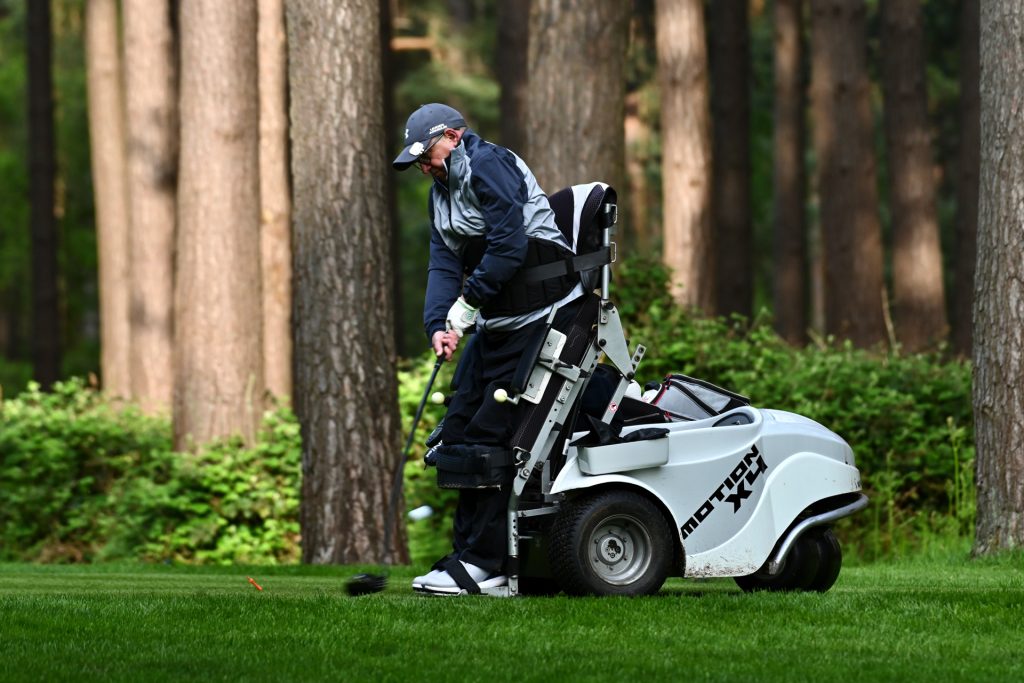
Phil says: “I love the competition and it’s always about challenging yourself and trying to push yourself to see where you can get to, and where you can drive the golf ball next. I just love the game, love getting out there, love meeting new people.”
This exacting ‘challenge against the self’ that golf offers resonates with Phil. He knows he must work on his game with discipline to maintain his skillset from a powered chair to improve shot by shot. Playing from a chair is a test of physical upper body strength, technique, rhythm and timing, Phil says, but also precision, and then the endurance and concentration that is needed in any 18-hole match.
“We can’t get it right every time in golf, we’re only human, aren’t we?” he smiles. “We can’t be a machine every single shot, but you try your best.”
Phil made his debut in an EDGA event in perhaps the best place of all (EDGA: the international body stages or directly supports 100-plus G4D tournaments worldwide each year), held at the most famous golfing town in the world. It was April 2023 but a wind made from ice made its stay in St Andrews; a wrapped-up and layered Phil and fellow players moved over to the first tee on the Eden Course, for Phil his very first competitive swing was at the ‘Home of Golf’.
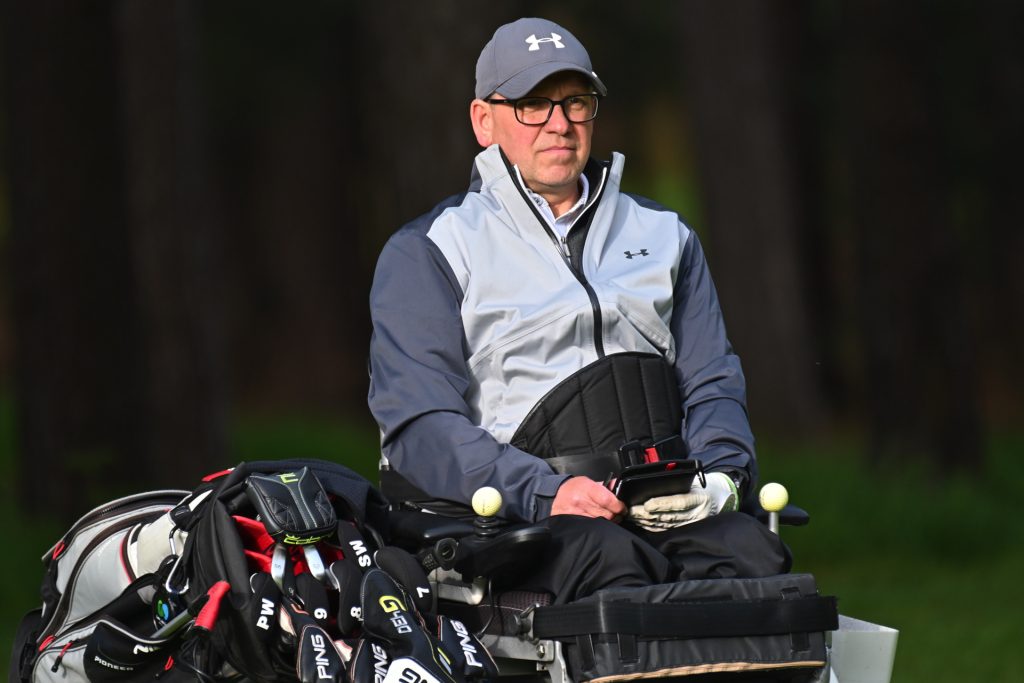
“This was one never to be forgotten,” grins Phil. “It was a bit nerve-wracking obviously, the first tee and you’re not used to it, with all the tournament signage and being announced on the tee. But actually, what an experience it was, and the people made you feel so welcome. I never felt uneasy: even when I was sort of on my own and waiting to tee off, people would talk to you, it was really good. I loved it.”
Phil and new friends also got to play at an RSM golf day at the beautiful Royal Burgess course on the trip near Edinburgh; RSM one of the key supporters of the St Andrews event and of EDGA’s work as a whole to make golf more inclusive.
Phil adds: “And then the next one was The G4D Open, another step up, massive because obviously The R&A and DP World Tour run this – it was amazing.”
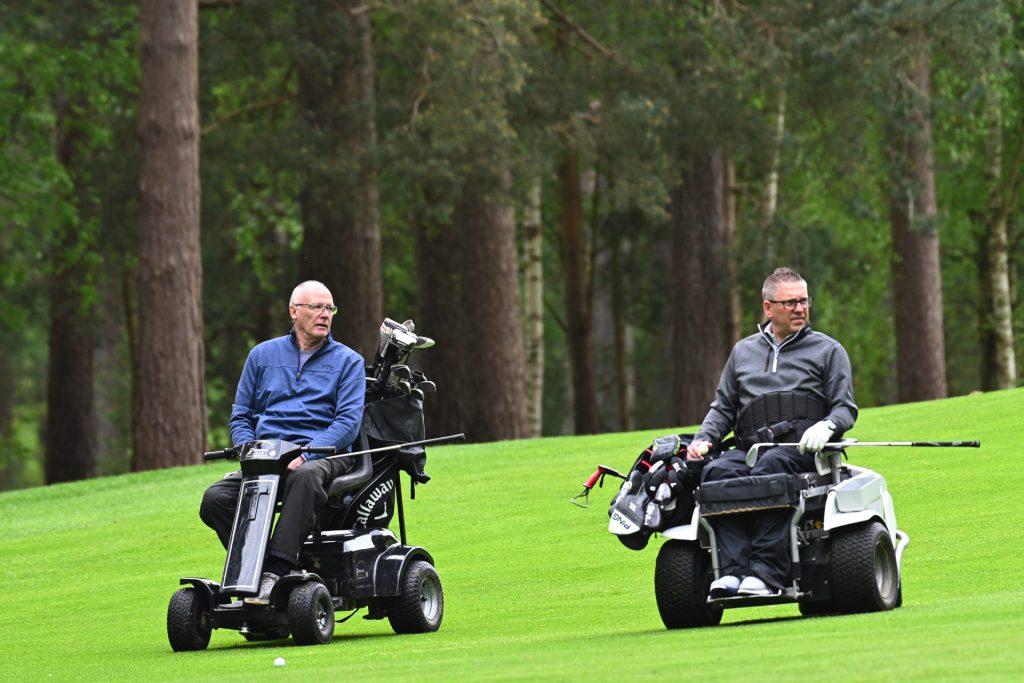
The first G4D Open, held at Woburn, was contested by players in nine sport classes, including two ‘sitting’ (chair) classes (along with standing, visual, intellectual categories), and welcomed 80 qualifying players from 17 nations, the action watched on media platforms all over the world. Phil admitted to having a few butterflies at the start.
“It was quite scary. I think it was the first day, first tee, when I felt it; I even had the guy from Sky News, he had the video camera and you’re like, ‘Oh my life, here we go!’ You have to just try and be composed and blank it out [the pressure], which I managed to do and thankfully put one straight down the middle, which was fantastic. So yes, all good, all good. Loved it!”
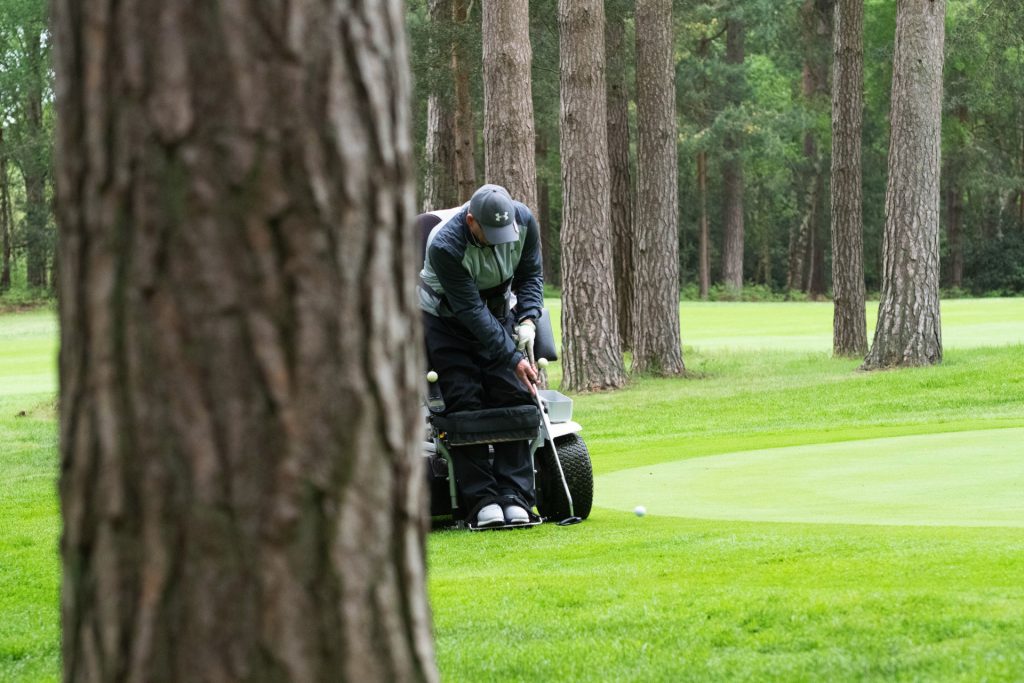
The following month, Phil played in the English Open for Golfers with a Disability at Kings Norton Golf Club, where he enjoyed his best result of the year, second in the Stableford category.
Phil has been through enough in his life not to let a few first tee nerves phase him for long. When we chat, he shakes his head wistfully when he thinks back to his 17 year-old self following the motor scooter accident. But part of the head-shake must be for how far he has come. How he adapted to a new life, developed a good career, while helping to bring up his daughter, Bethany.
He was born in Newmarket, Suffolk, in 1970, and his family moved to Cambridgeshire. By the year 1987, aged 17, Phil was in a scooter club which went on rallies around England, riding out to hear Northern Soul and Ska music at festivals. He would also use his scooter to get to and from work and one day, when he was going back into work for the evening, he made a rash decision to overtake and hit an oncoming car. His injuries were so serious he was at one point given 48 hours to live.
Phil recalls: “I don’t remember anything, I just woke up. I was pretty much out of it. I had a fractured skull, swollen brain, broken ribs, broken leg and, obviously, paralysed. There was a visit from the doctors where they do their ward round and I was told, when my parents weren’t with me, that I was paralysed and wouldn’t walk again… I went through quite a lot of pain and headaches before the realisation came of what had actually happened.
“I think that my drive and determination came from when I was moved to the spinal unit. I was told that I could be there for anything from six months to a year for rehab, and adjusting to living with a wheelchair. I said to my Dad, ‘I can’t be in here for a year, I just can’t do it’. And my Dad replied, ‘Well, you know what you’ve got to do then’. And I think that was a trigger in my head that made me think, I’m the only one who can do this. I’m the only one who can drive this. From that day, I’ve always pushed myself. Don’t get me wrong, it was tough and there were emotional times and there was a lot of adapting and a lot of aggression and frustration. But yes, my driven determination came from that first conversation really, and I’ve always pushed myself to the best of my ability because there’s always room for improvement in our lives.”
Phil adds: “You’ve got a choice. You can sit around and mope about it or you can dust yourself down and think, well, what can I actually do to make a difference? So you just crack on, get on with it.
“The only thing that I can’t do is walk. If I want to do anything else, I can do it: skiing, golf, water skiing. If you put your mind to it and you’ve got the drive and determination, you can do anything you want to do.”
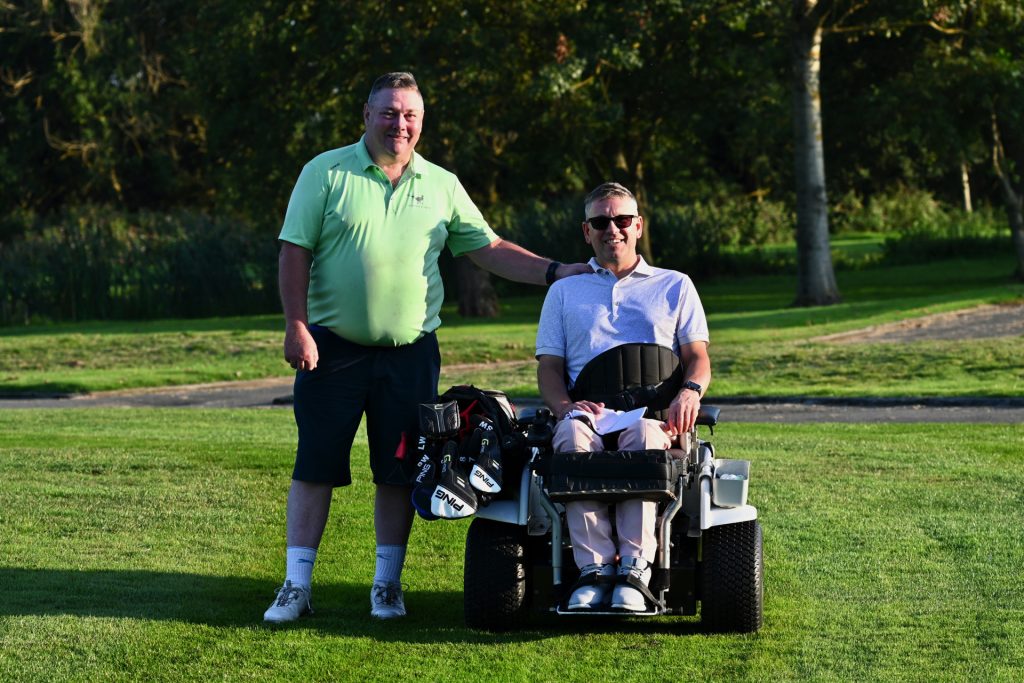
Tough times back then, but Phil always tried to ‘crack on’. As he grew older, things took a very positive turn for Phil. Daughter Bethany is now grown up and married, while Phil has a loving partner of 10 years, Melanie, or ‘Mel’, and they dote over their pride and joy of today, Vinnie the St Bernard dog. Mel has taken up golf recently herself (Phil believes he is a good coach) and in fact, on the day of our interview they were heading out to play nine holes together.
Even 30 years or so ago, golf was a great discovery after his accident and Phil, then aged 21, and his father Paul went to a taster day given by the Handigolf Foundation, a supportive organisation for players in chairs. For a few years, Phil played from a conventional wheelchair, but a light and mobile model in which he could enjoy swinging the club, which he chose to do with both hands, a method he has continued with despite investing more recently in a powered chair, a brand called Paragolfer (this type of machine elevates the player into a conventional standing stance for the shot, and some players elect to swing one armed – ‘backhand’ or ‘forehand’ in effect – for ease of movement around the chair, but Phil has stayed with what works well for him).
For nearly a decade he decided to put golf on hold as he focused on his career and family (he has worked many years in telecommunications and currently is a manager of a Tesco phone shop within a larger store) but in his forties he got back into the sport. He had maintained links with the Handigolf Foundation (today he volunteers as its secretary), while an inheritance left by his Grandma helped Phil make the key decision to invest in the Paragolfer. While it was a “massive step change” to now play from the standing position in the chair rather than being conventionally seated, taking a lot of practice, he nevertheless soon adjusted and has never looked back.
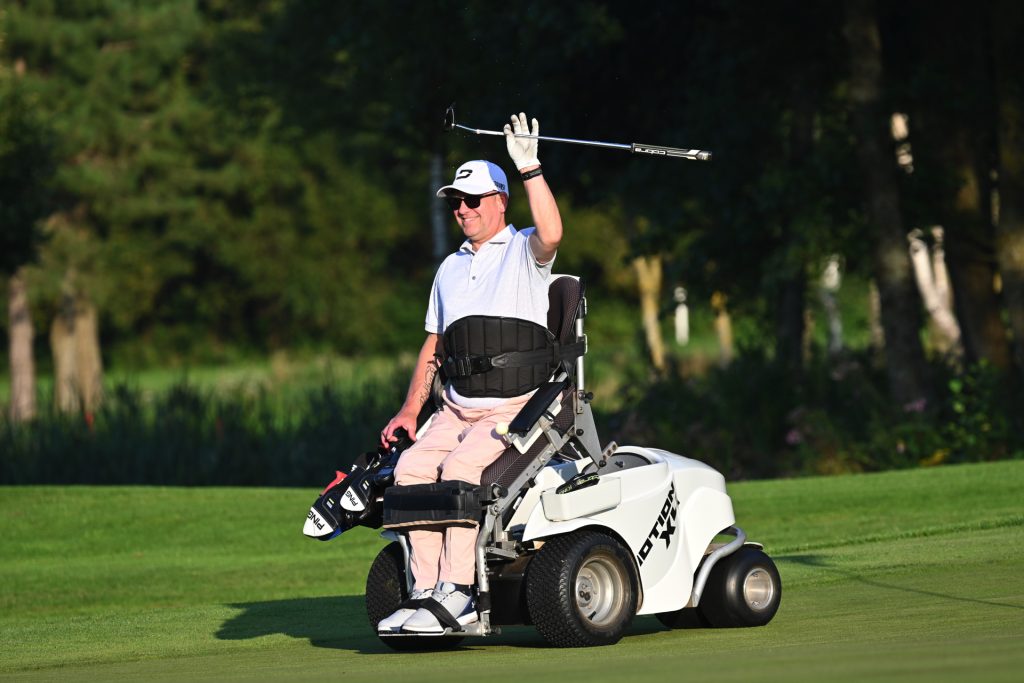
Phil knew of EDGA from fellow seated player, Terry Kirby. Fast forward to 2022, and Phil had started playing with Jason Croucher, who lives close by and who was himself looking at signing up for EDGA. Retired firefighter Jason travelled that April to Coventry, to make his own debut in the Johnny Reay Classic. Picking up the phone after finishing, Jason enthusiastically relayed his positive experience and Phil started to look into it all, eventually signing up for St Andrews this April.
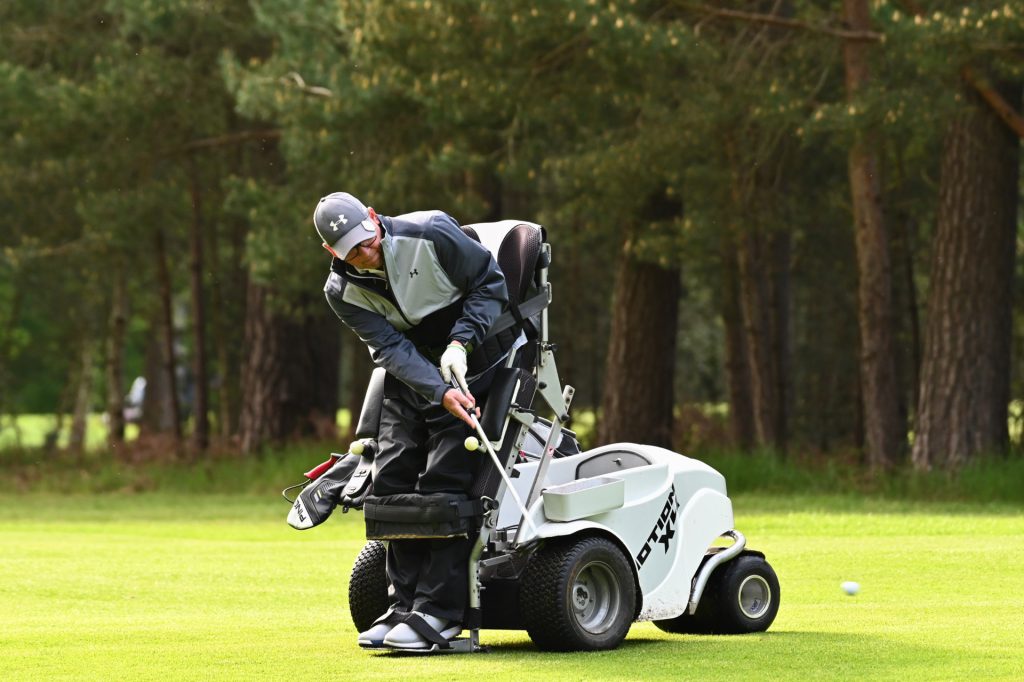
“From the first day, it just felt good,” he said. “There’s no stress. I find that with EDGA that the people you play with tend to put you at ease, it just brings out the best in you. Although it is competitive and you are all playing for World Ranking points, it’s that friendliness that you get within it.”
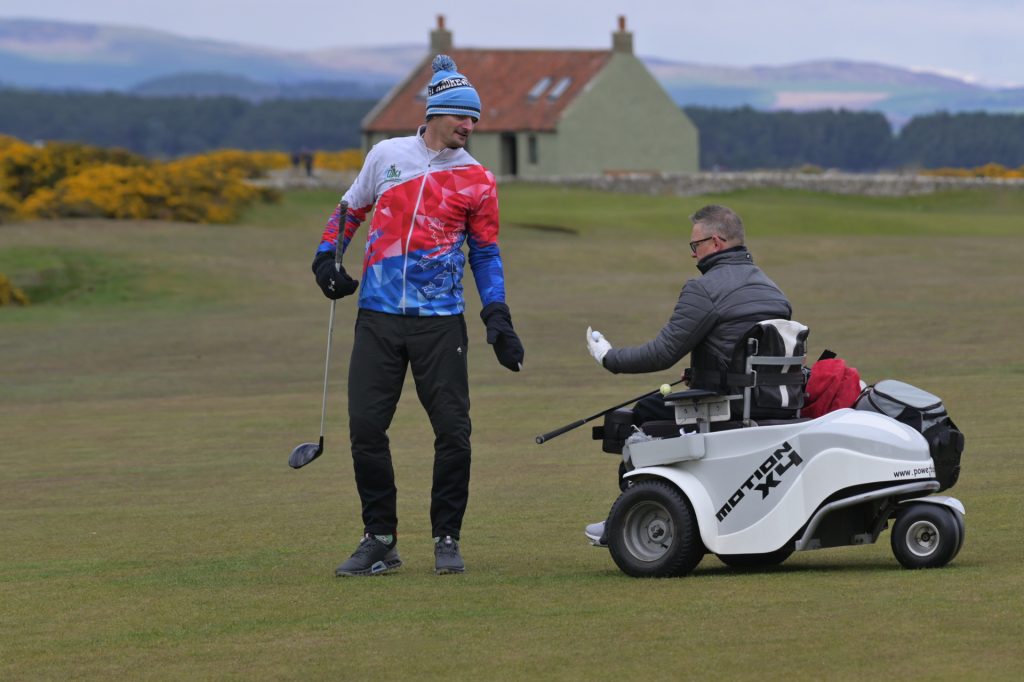
On the first day at St Andrews, Phil played with one of the Czech Republic golfers who had made the trip, Jan Procházka. The two men got on well. Phil said: “We were praising each other on good shots. At the end, we had a massive hug on the green and were friends forever, and then he went and got me a golf ball with the Czech Disabled Golf Association logo on it. It just makes it so special, you never forget those moments. All those worries and concerns about playing go out of your head.”
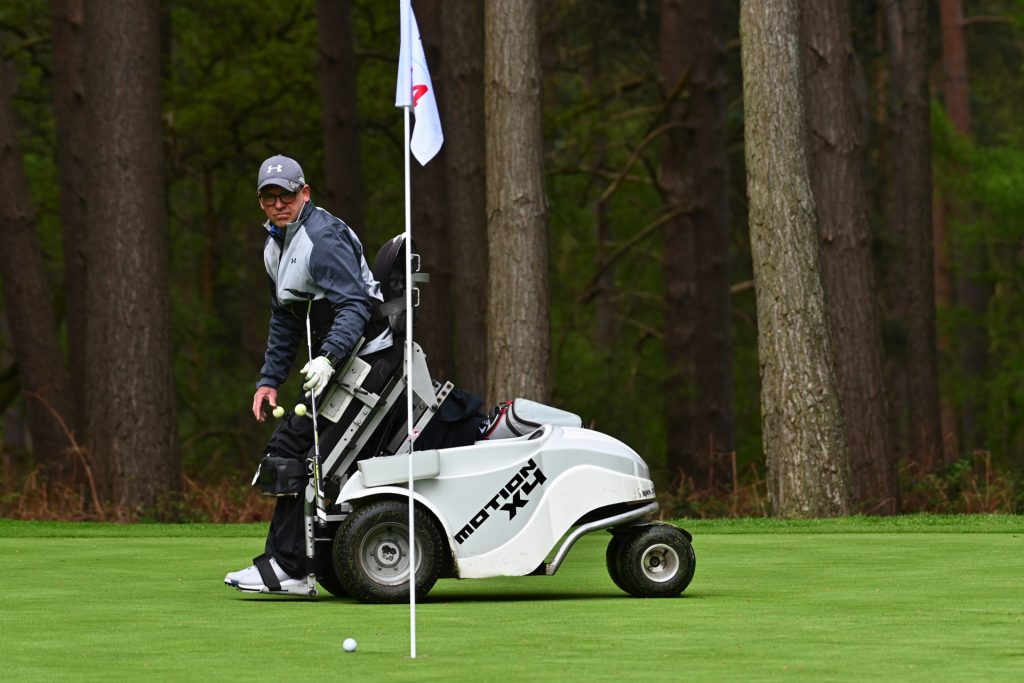
It’s not all about the hugs, Phil does relish being competitive. But again, part of this competition is to get the most out of himself, while enjoying the thrill of golf with his playing partners.
“It’s all about the next shot. So if you have a bad shot, you’ve just got to put that out of your head and then play the next one, haven’t you? It’s about remaining focused. The minute you get frustrated is the minute you’ll lose the game. That’s it. Putting in the grind, but staying relaxed.
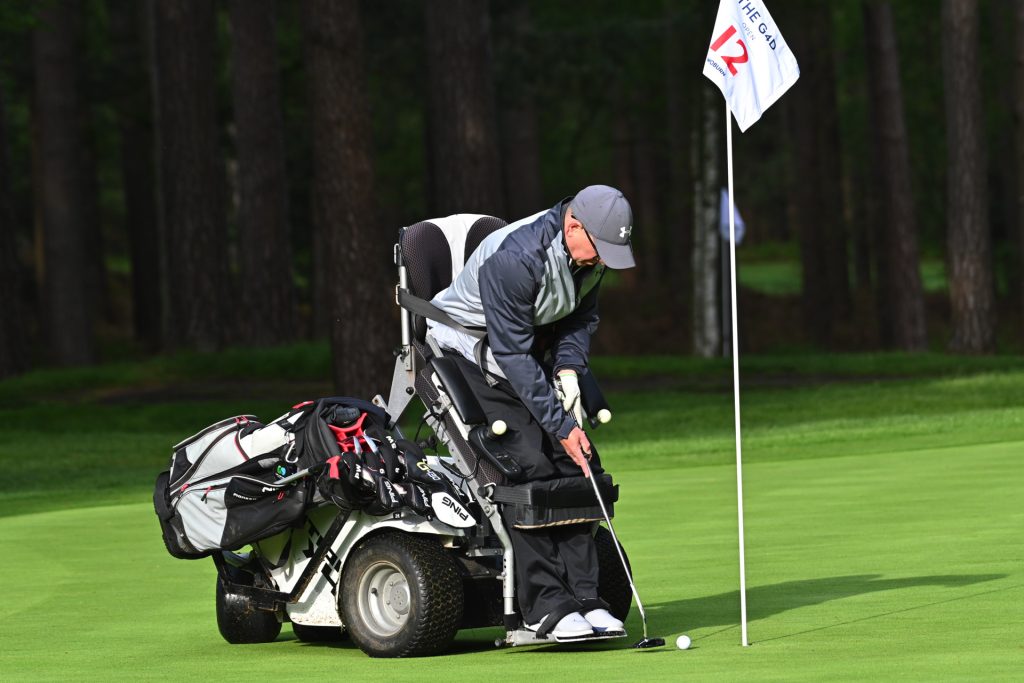
“I went through a stage where I struggled massively with: ‘I don’t hit the ball a long distance or don’t do this, I don’t do that’. Then you start doubting yourself, are you good enough to compete? I started asking other people, do I change my swing? Do I go from two hands to one hand to generate more speed? A lot of the feedback I got was, you might not hit it a long distance, but you’re straight and you’re consistent. So although it might take you an extra shot or two shots to get to where you need to be, that’s what the handicap system is there for.”
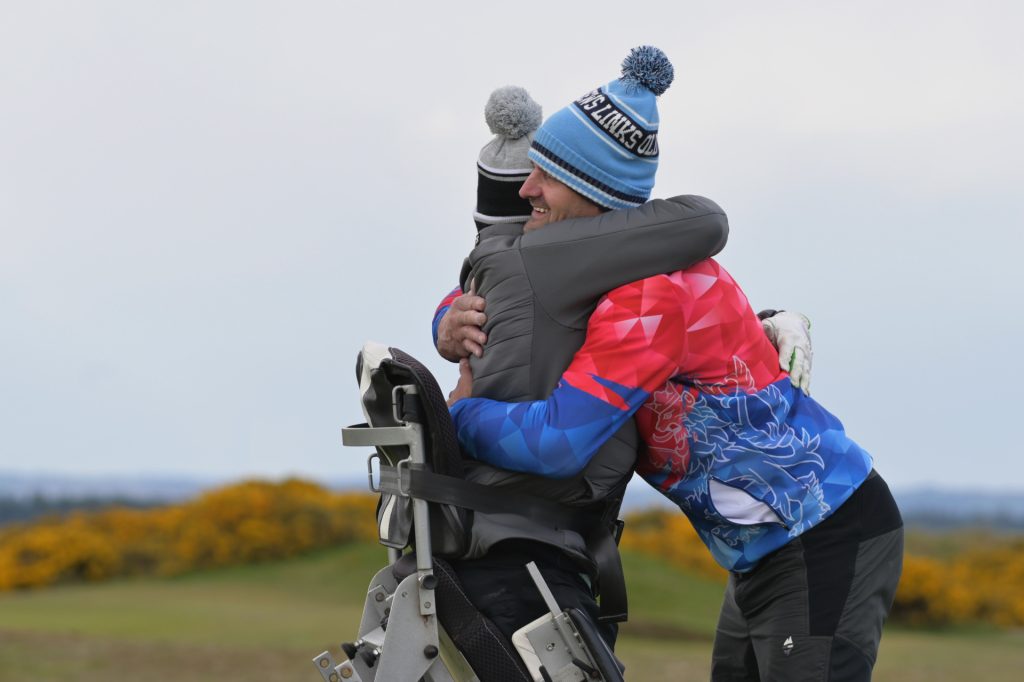
He adds: “I played at the Captain’s Day this year at The Cambridgeshire and played with some really big hitters; they were in trouble in the trees or in the rough. Sometimes it’s not about being long, it’s about being consistent. I’m not saying I want to drive the ball 300 yards like Rory McIlroy, but if I could get an extra 10, 15 yards, then that would be fantastic. You need to be realistic. I just need to tweak what I have and get the best out of what I can do. Luckily enough, I have a good short game, so chipping and putting is normally really good. Off the tee I’m good, I’m just not long, but you’re still able to compete. It’s shown me that within EDGA, and obviously when you look at the World Ranking points for Stableford seated, I was sixth in the world, and I’ll take that for the first season. All I can do is progress for the future.”
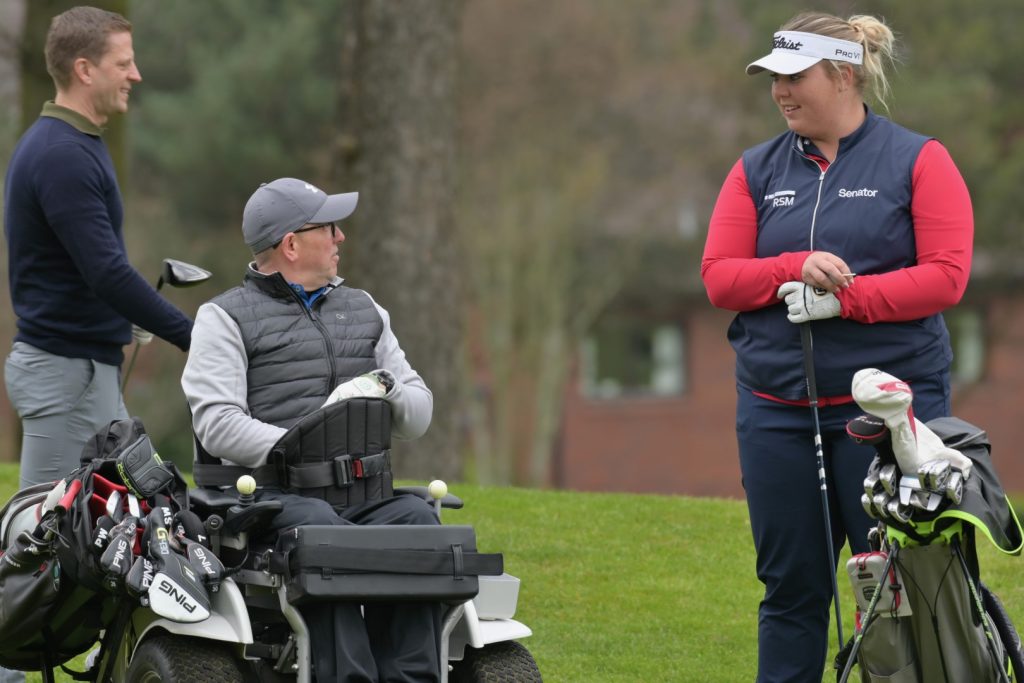
Phil is working on his upper body strength and movement, a relaxed grip, the release through the swing with supple wrists, all aiming to add power and timing where he can.
As a wheelchair user, Phil has faced in playing golf many of the travel, facility and customer service challenges he faces in the rest of his life. He remains positive because, as he says, how you go about life is a choice. However, he is optimistic that more golf venues are working harder to be accessible, including on the course for powered chairs (for example, he thinks it “fantastic” that his club The Cambridgeshire is looking to create flexibility in the winter months to ensure that even if part of the course is too wet for heavy Paragolfers, rather than simply closing this option, a route of seven holes can be provided to ensure play whenever possible).
Apart from friends and staff at The Cambridgeshire, Phil offers special thanks to Cae Menai-Davis, PGA coach at The Shire and founder of The Golf Trust, for his support in helping to get him started with the Paragolfer and offering invaluable encouragement and swing advice. He is also grateful to the Handigolf Foundation, his parents, partner in life and golf, Mel, and many great new EDGA golfing buddies, including Jason of course, the two of them playing regularly. Neither man quite remembers where their match scoring lies: “too much time laughing,” says Phil. Phil says he is grateful to his many supporters who are too many to mention.
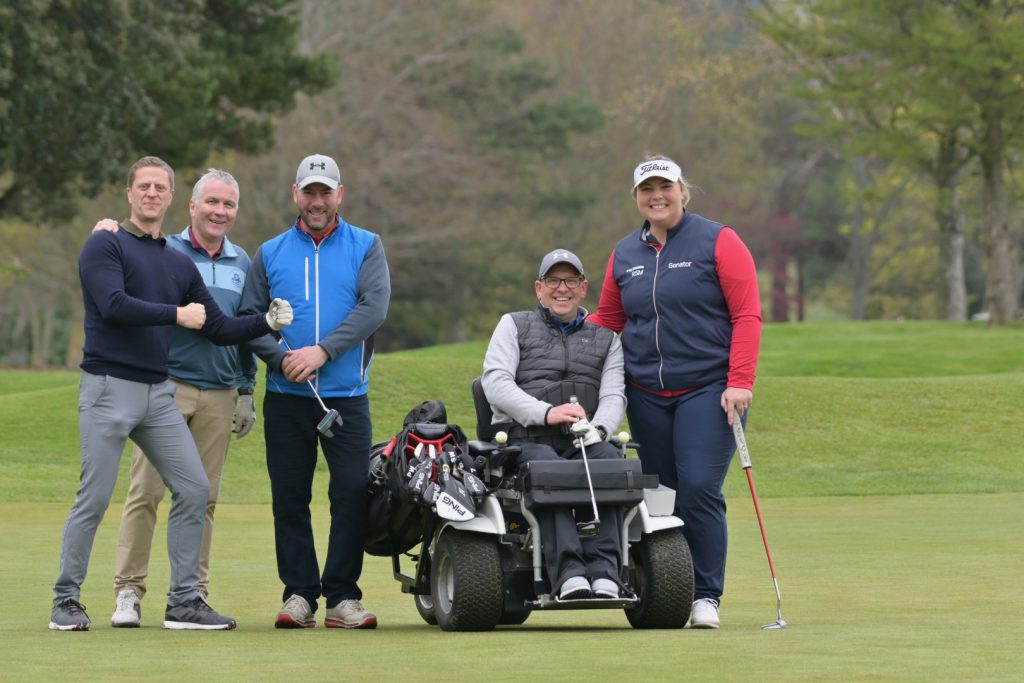
After being inspired this year in competition, Phil has his eyes on 2024.
“I definitely want to progress next year, push myself, try and get my first win in an EDGA tournament if that’s possible. Stiff competition out there, but I think it’s within me and what I’ve done this year will drive me to push harder.
“Golf is massive in my life obviously… It’s about getting out there, meeting new people, making new friends, competing, and hopefully coming out with a win. I absolutely love it and Melanie’s now got the bug as well, so that steers me on. I’ve been lucky enough to play some great courses this year. St Andrews was massive, a massive opportunity. Royal Burgess, just all these courses, a once in a lifetime opportunity and sometimes you don’t always take it in until you come back and you reflect on where you’ve played. I’ve actually played St Andrews! It’s amazing. Woburn was fantastic, obviously, the sound that you get through the trees there when you strike a good shot. Just brilliant. Absolutely brilliant.”
Contact EDGA
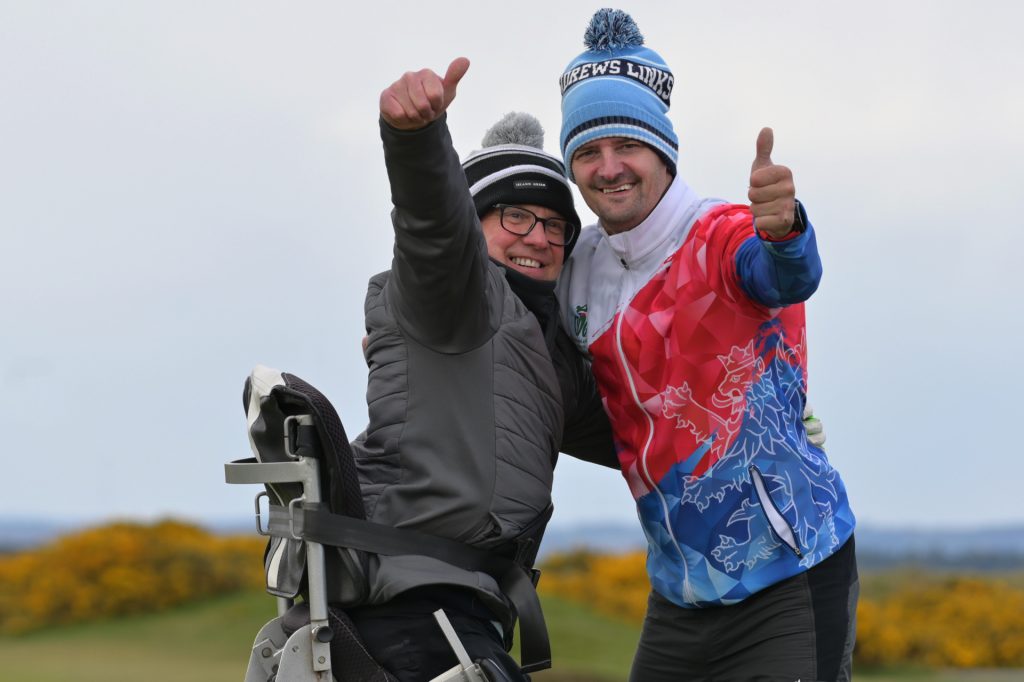
NB: When using any EDGA media, please comply with our copyright conditions


